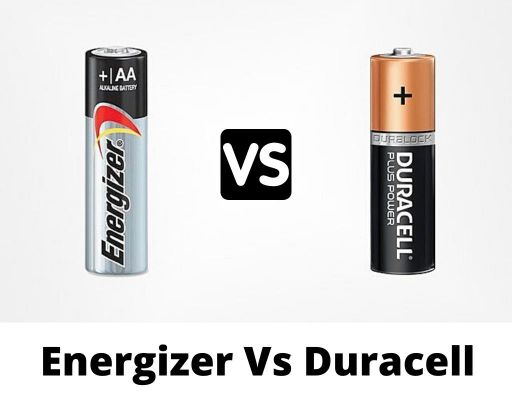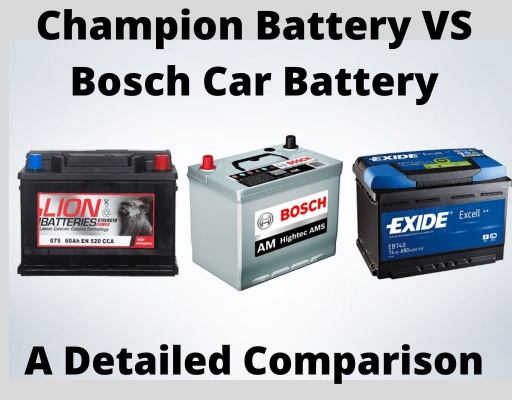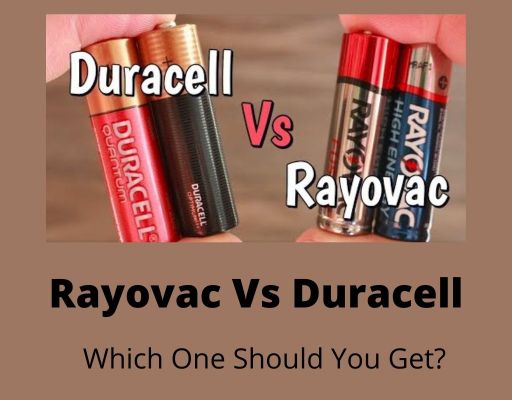When it comes to Eneloop Vs Amazonbasics comparison, is it possible to name one parameter that declares the winner?
Yes, it is possible, and the parameter is the charging cycle. You will be amazed to know that Eneloop batteries have a recharge cycle of 2100 whereas Amazonbasics batteries have only 1000.
However, there are other factors to consider too. When you have a clear overview, you will understand which one will serve the best in certain situations.
Eneloop Vs Amazonbasics: Quick Comparison Table
Before moving on to the main discussion part, have a quick look at the comparison table below that summarizes the whole topic.
Eneloop Vs Amazonbasics
| Features | Eneloop | Amazonbasics |
| Runtime for AA size (2000mAh) | Approximately 20 hours at 100mAh load | Less than 19 hours at 100mAh load |
| Cell Chemistry | NiMH | NiMH |
| Temperature Rating | -20°C or -4°F | -20°C or -4°F |
| Charging Cycle | 2100 | 1000 |
| Capacity in Storage | 70% after 10 years | 80% after 2 years |
| Low-Temperature Performance | Very Good | Not as good as Eneloop |
| Cost | Higher than Amazonbasics | Lower than Eneloop |
About the Brand: Eneloop Vs Amazonbasics
Panasonic is the manufacturer of Eneloop and Eneloop Pro batteries. The brand Eneloop was owned by Sanyo.
But by taking over Sanyo, Panasonic became the owner in 2009. They manufacture the batteries in Japan.
On the other hand, using the same Japanese technology of NiMH rechargeable battery technology, Amazonbasics produces its batteries.
However, it is not revealed the name of their manufacturer in Japan. You can read this article that confirms the company not revealing its suppliers.
Both brands have a distinguished product lineup including lots of different sizes and make.
After some research, I found that Amazonbasics has a wide range of rechargeable and non-rechargeable batteries.
But Eneloop offers only a handful of models. Other brands from Panasonic have a rich portfolio but it is not my concern in this article.
The common models of Eneloop and Amazonbasics include rechargeable AA, AAA, and HHR-75AAA.
So, the discussion below doesn’t include other battery models made by these brands.
What’s the Difference Between Eneloop and Amazonbasics Batteries Based on Features?
I have shown the differences based on performance, runtime, cell composition, operating temperature, charging cycle, self-discharge rate, and cost. Let’s get started.
Performance and Runtime
A low self-discharge rate is a key to better and more reliable performance over the years.
And the capacity of these batteries determines how long they can power certain devices under certain loads.
According to the independent testing team at Wirecutter, the Eneloop AA rechargeable battery has almost 80mAh more capacity than Amazonbasics AA.
Though the marketed or claimed capacities of these batteries are the same, it is different in real life.
It is understandable because of the price difference. For a lower price, manufacturers are bound to use lesser-quality components to make a profit.
As per the official spec sheet, both brands’ AA batteries should last 20 hours at a 100mAh load.
In real life, Amazonbasics batteries don’t last as long as Eneloop batteries. So, the winner here is Eneloop.
Cell Composition
Both of the battery brands use NiMH cell composition which means Nickel Metal Hydrite.
The benefit of using this technology over Ni-Cd is that it offers 30-40% more capacity, a lower self-discharge rate, and better recycling.
In this section, there is no winner.
Operating Temperature
Like the previous point, both Eneloop and Amazonbasics have the same operating temperature range.
But in real life, some testers say that Eneloop batteries perform better in lower temperatures.
Though the low-temperature applications are not that many, you can still count Eneloop as the winner by a slight margin in this parameter.
Charging Cycle
You have reached the deciding parameter that I mentioned in the introduction.
There is a huge gap in the limit of charging cycles for all three battery sizes in this comparison.
All Eneloop batteries can be charged and discharged up to 2100 times whereas Amazonbasics batteries can withstand only 1000 cycles.
Here, Eneloop aces Amazonbasics by a huge margin, and it should be the deciding factor for many.
Self-discharge Rate
Another big difference between the two brands is the self-discharge rates of their rechargeable batteries.
Eneloop claims that its batteries can still show 70% capacity after 10 years in storage.
I don’t have the data to prove it but Amazonbasics batteries’ self-discharge rate makes Eneloop the king.
According to the manufacturer, Amazonbasics batteries can hold 80% capacity only after 2 years in storage.
So, the rate is 10% every year against Eneloop’s only 3% every year. I think that it clears the confusion if you still have any.
Cost
The available models in the rechargeable NiMH battery category for both brands are limited. It includes only AA, AAA, and HHR-75AAA/B-6.
Here, I’m listing the products along with their price difference for your convenience.
AA-size
The price difference here is only around a dollar.
AAA-size
The price difference here is only around 21 cents.
HHR-75AAA-size
The price difference here is around 88 cents.
You have got a clear picture of their price difference. What you should notice here is that the gap in cost is not that big.
In comparison to that, the performance, build quality, and shelf life differences are big.
So, it is evident that Eneloop batteries cost less in the long run. Let me give you an example.
Let’s assume that you buy a rechargeable battery for $4, and use it for 6 years.
At the same time, you have bought a cheap brand spending only $2. But it may have lasted for almost 2.5 or 3 years.
In the same period, you have to buy 2 cheap batteries whereas it requires only one expensive battery.
I hope that you have understood what I meant to say here.
Eneloop or Amazonbasics: Which One to Choose?
Clearly, Eneloop is the winner here beating Amazonbasics rechargeable batteries by a long margin.
So, buying an Eneloop battery will be the wisest decision.
However, the price can be a big deal too. Those who don’t want to spend too much money on rechargeable batteries should go with Amazonbasics.
At a reasonable and affordable price, you can get decent-quality rechargeable batteries.
I know that these are not as durable or long-lasting as Eneloop; still, it is okay to go with the low-end option.
There are lots of scenarios where reliability or runtime is not a big deal as they are not that sensitive.
In such instances, Amazonbasics can be a perfect choice. Also, the brand sells batteries in various pack sizes.
Hence, you can buy in bulk and save even more.
Frequently Asked Questions(FAQs):
u003cstrongu003eAre Amazon Rechargeable AA Batteries Any Good?u003c/strongu003e
Considering the price, yes, they are.
u003cstrongu003eWhy Are Eneloop Batteries Better?u003c/strongu003e
Because of lower self-discharge rate and more charging cycle limits than competitors
u003cstrongu003eWhere Are Amazonbasics Rechargeable Batteries Made?u003c/strongu003e
Japan
u003cstrongu003eWhere Are Eneloop Batteries Made?u003c/strongu003e
Japan
u003cstrongu003eAre Amazon Basics Rechargeable Batteries Pre-Charged?u003c/strongu003e
Yes
u003cstrongu003eDo NiMH Batteries Last Longer Than Alkaline?u003c/strongu003e
Yes
Conclusion
In this Eneloop vs Amazonbasics comparison, it is clear who the winner is.
Those who want reliable performance, increased service life, longer shelf life, and low-temperature operability should choose Eneloop without any doubt.
Here, the price must not be a concern for you. In the long run, the price becomes similar to or lower than cheap rechargeable batteries.
On the other hand, having a budget restraint and not-so-important use cases suggests that Amazonbasics is better than Eneloop.
Before you go, I want to recommend a very informative video comparing various battery brands. Watch it to know how these batteries perform in real life.



